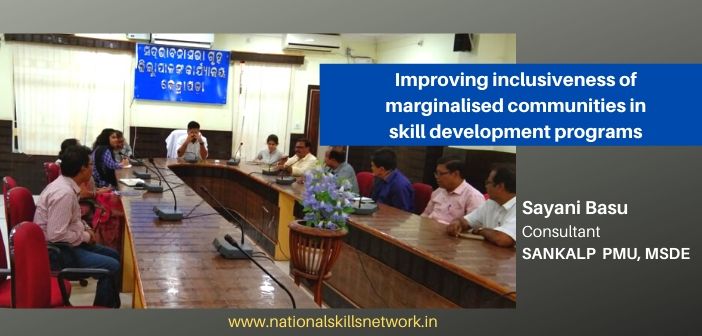
Different people can describe inclusion in different ways. However, if you ask what exclusion is, there is only one way of describing it: to be left out. For holistic and sustainable development, it is important that nobody is left out. It is well recognized that women, people with disabilities, indigenous communities, scheduled castes, and various minority groups often find themselves at the margins of development.
While they are mostly referred to as marginalized groups, it is important to note that they are high in number and it is often a result of power dynamics and social stereotyping that a huge percentage of the population is termed marginalized and are excluded. For a healthy society, it is imperative that there is equal access to opportunities for one’s socioeconomic development. Better livelihood options are empowering and can be an important pillar for an inclusive society.
The heterogeneous nature of this excluded section poses a range of complex challenges that require carefully designed policies for reddressal. The past few years have seen concerted and focused efforts to enhance the accessibility, relevance, and quality of skill training programs by government and non-government organizations in India. While these efforts have improved the link to employment for many, there is still a large section of the society that remains underserviced.
MSDE’s SANKALP program
Recognizing this, the Ministry of Skill Development and Entrepreneurship (MSDE) has made inclusion as one of its key focus areas. Skill Acquisition and Knowledge Awareness for Livelihood Promotion (SANKALP), a World Bank-supported program, has been working with State and District-level skill development machineries, to strengthen institutions and promote decentralization. It also aims to improve the inclusiveness of marginalized communities in the skill development programs.
SANKALP, in its unique approach, does not attempt to implement skill programs at a large scale but designs and implements different projects as pilots. These pilots further serve as blueprints for the States and Districts to adapt and customize, based on their local needs. SANKALP through its concerted efforts aims to integrate inclusion in the design and implementation of skill training, at all stages of the skilling ecosystem.
 Gender inclusion under SANKALP
Gender inclusion under SANKALP
There is a huge gender disparity in the current workforce in India. Hence, gender inclusion is one of the areas that SANKALP is working on. Increasing women’s participation in skill development programs, and thereby, in the workforce is a priority.
One of the initiatives taken under SANKALP was developing a Gender Action Plan (GAP) with the aim to provide a roadmap for promoting and improving the participation of women in skill training. Since its launch in 2015, the Skill India Mission has had a special focus on women, empowering them for better and secure livelihood. UNI India report shows that there is a nearly 97% increase in admissions of females in skill development programs in 2018 as compared to 2014, with a rise to 173,105 women trainees from 87,799.
However, the increase in skill training enrolment has not resulted in a proportionate increase in the participation of women in the workforce. Not only are women under-represented in different job roles across industries, the gender-based gap in wages still remains to be a cause of concern. The process of preparing this plan entailed the careful study of the current skill development value chain through the gender lens and identification of challenges and opportunities at each stage.
Based on the challenges identified, SANKALP, through this Gender Action Plan (GAP), outlined priority areas for improving women’s participation in the workforce. Strategies and action plans proposed in GAP aims to serve as a foundation for innovations and ideas, making skill training and employment for women impactful and effective.
This has become the guideline for gender inclusion for skill development initiatives. These initiatives include re-examining training curriculum through the gender lens, creating awareness on gender and prevention of sexual harassment at work, and designing innovative pilots for training women in non-traditional livelihood.
Decentralisation – an important instrument under SANKALP
Decentralisation can prove to be an important instrument for inclusion. In a first, the District Skill Committee of Kendrapara, Odisha with support from the State Institute of Development of Arts and Craft (SIDAC) developed a project to skill women artisans in the traditional craft of Golden Grass. 3000 women artisans across 12 villages in Kendrapara will be trained under this project, to generate a sustainable source of livelihood through technology and market linkages. Upholding its vision of inclusion and decentralization, this initiative is being supported by SANKALP. The forward and backward linkages provided by the project will enable the women artisans to gain higher agency in their economic and social growth.
Related Article: MSDE, through SANKALP, partners with SIDAC and DSC Kendrapara, to train 3000 women artisans – Read more: https://nationalskillsnetwork.in/msde-through-sankalp-partners-with-sidac-and-dsc-kendrapara-to-train-3000-women-artisans/
Furthermore, SANKALP is working closely with 5 States to develop innovative and diverse skill development opportunities for wages as well as self-employment. Through this initiative, institutional and systemic obstacles for PwDs to participate in skill training for enhanced livelihood opportunities is sought to be identified and redressed.
Inclusiveness of marginalized communities in skill development programs
The scope for inclusion is not limited to the traditional notion of marginalised communities. SANKALP recognises the urgent need to work with the bottom of the pyramid, communities trapped in the vicious circle of poverty due to complex social structures. The Ministry is currently working to develop a project to make the role of manual scavenger safer, dignified and aspirational.
Through its unique approach, SANKALP critically examines the current skill development programs, identifies gaps, and design solutions. It seeks to improve the quality of skill development in India, which cannot be achieved without ensuring inclusion.
Guest Author: Sayani Basu, Consultant, SANKALP PMU, Ministry of Skill Development and Entrepreneurship












